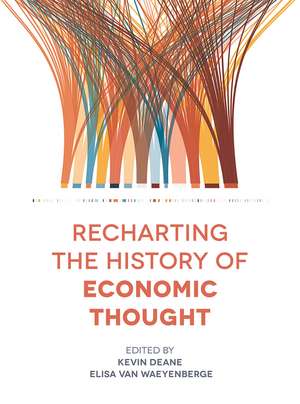Recharting the History of Economic Thought
Editat de Kevin Deane, Elisa van Waeyenbergeen Limba Engleză Paperback – 7 apr 2020
Preț: 347.53 lei
Preț vechi: 390.48 lei
-11% Nou
Puncte Express: 521
Preț estimativ în valută:
66.51€ • 69.01$ • 55.59£
66.51€ • 69.01$ • 55.59£
Carte tipărită la comandă
Livrare economică 17-31 martie
Preluare comenzi: 021 569.72.76
Specificații
ISBN-13: 9781137605245
ISBN-10: 1137605243
Pagini: 317
Dimensiuni: 168 x 240 mm
Greutate: 0.55 kg
Ediția:1st ed. 2020
Editura: Bloomsbury Publishing
Colecția Bloomsbury Academic
Locul publicării:London, United Kingdom
ISBN-10: 1137605243
Pagini: 317
Dimensiuni: 168 x 240 mm
Greutate: 0.55 kg
Ediția:1st ed. 2020
Editura: Bloomsbury Publishing
Colecția Bloomsbury Academic
Locul publicării:London, United Kingdom
Caracteristici
Helps students to develop their skills of critical assessment by comparing neoclassical, mainstream theory with alternative approaches
Notă biografică
Kevin Deane is Lecturer in Global Public Health at Queen Mary University of London. He is a member of Reteaching Economics, and the co-coordinator of the Teaching Political Economy Working Group for the International Initiative for the Promotion of Political Economy (IIPPE). His research interests focus on the political economy of health and development, primarily with an application to the HIV epidemic in Eastern and Southern Africa.Elisa Van Waeyenberge is a Senior Lecturer in Development Economics and Head of the Economics Department (job-share) at SOAS University of London. Her research interests include alternative macroeconomic policies in developing countries, the role of International Financial Institutions across policy and scholarly realms, as well as the financing of infrastructure and public service provision. She has authored several articles on these topics as well as edited books with colleagues, including The Political Economy of Development: The World Bank, Neoliberalism and Development Research, together with Kate Bayliss and Ben Fine. She enjoys teaching macroeconomics from a historical perspective as well as drawing the attention of students to different research methods in economics and political economy
Cuprins
1. Introduction (Kevin Deane and Elisa van Waeyenberge) 2. Are we all rational, optimising agents? (Satoshi Miyamura) 3. What is the role of mathematics in economics? (Ourania Dimakou) 4. How are things produced? (Susan Newman) 5. How and why are things consumed? (Mary Robertson) 6. Do economies reach equilibrium? (Robert Jump) 7. How is Income Distributed? (Jo Michell) 8. What is the role of Money in Economics? (Peter Hughes and Annina Kaltenbrunner) 9. How are goods and services valued in economics? (Marco Veronese Passarella) 10. What causes economic crises? And what can we do about them? (Bruno Bonizzi and Jeff Powell) 11. How do economies grow? (Chakib Bourayou and Elisa Van Waeyenberge) 12. How do countries develop? (Ewa Karwowski and Elisa Van Waeyenberge) 13. How does economics address gender? (Hannah Bargawi) 14. How does economics address the environment? (Ben Groom and Marta Talevi) 15. What is the role of the state in economics? (Shawky Arif) 16. Can economics explain everything and solve all our problems? (Kevin Deane).
